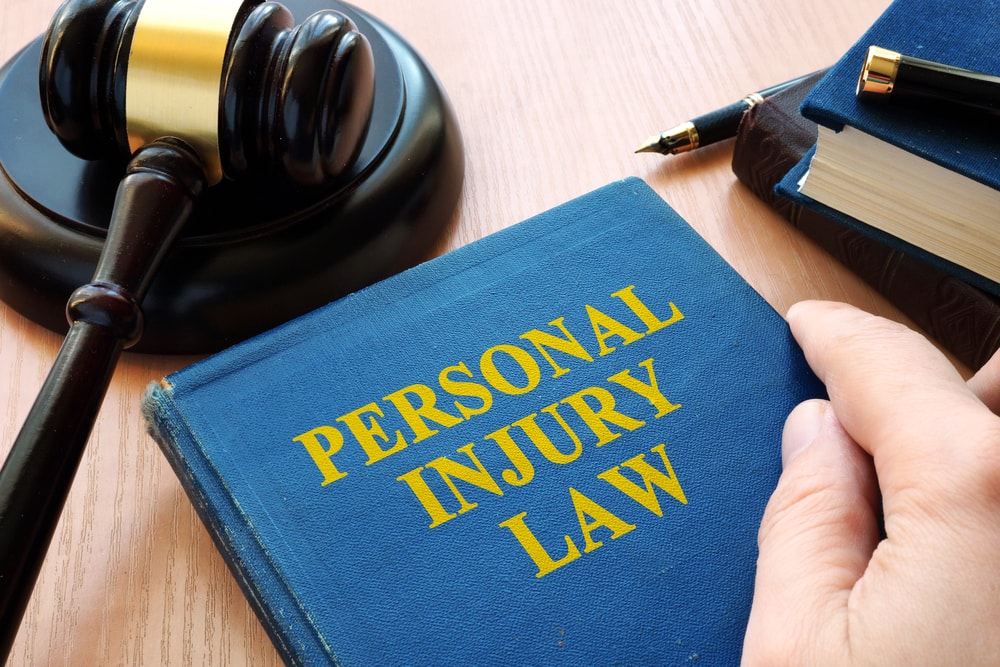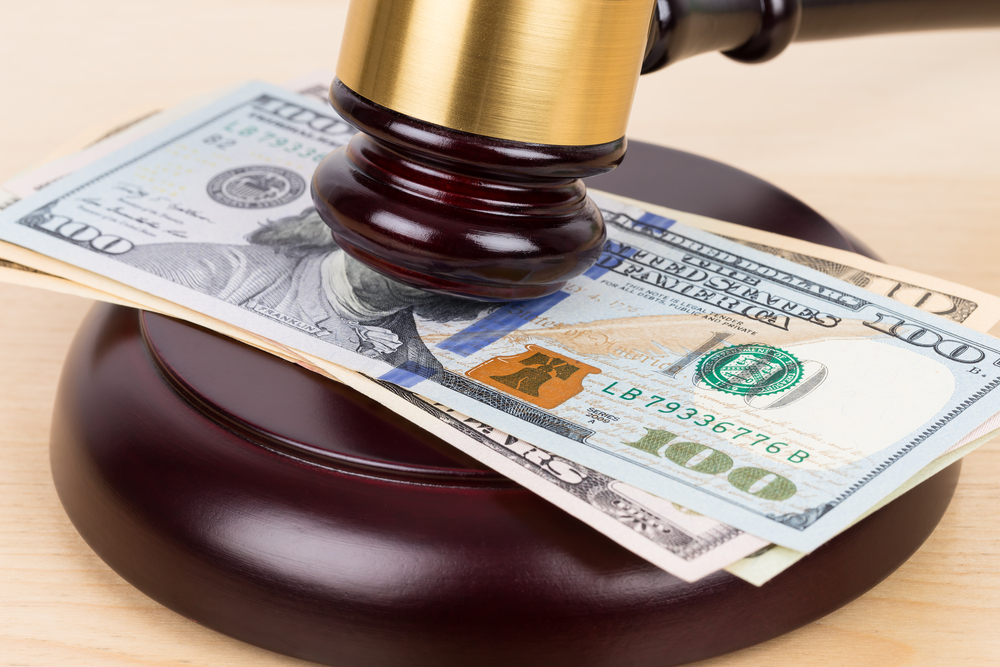When you’ve been injured as a result of another person’s actions, there’s always a strong need for justice. After all, why should you bear the burden of the costs associated with your injury when it’s someone else’s negligence that caused it?
The personal injury claims process is complicated and includes hiring an experienced attorney to:
- Determine if you have a valid claim
- Investigate the incident
- Review medical treatment and records
- Send a demand package
- Negotiate with Insurance Company
- Negotiation medical liens
- File a lawsuit if necessary
While you can certainly file an insurance claim on your own without a lawyer, hiring a professional legal team will be incredibly beneficial. Not only will you have to do less of the legal legwork yourself, but personal injury victims ultimately tend to get bigger settlements in the end.
Your personal injury lawyer will likely handle the bulk of the work on your behalf, but it’s important to understand the injury claim process as your attorney is moving through it so that you can play your part adequately.
What Is A Claim For An Injury?
The first thing you need to understand is what an injury claim is. A claim is defined as a formal proclamation that you, the plaintiff, are owed compensation for the loss. A personal injury claim asserts your right to be paid back for damages incurred as a result of an injury caused by another – the defendant.
Common Types Of Personal Injury Cases
- Assault and battery
- Slips and falls
- Medical malpractice
- Injuries in the workplace
- Product liability
- Car accidents
What You Need To Do Before Meeting With A Personal Injury Lawyer
So, you feel that you have grounds to file a personal injury claim against the party you feel is responsible for your injury. Before any official legal action can be taken, there are some things you need to collect or sort out.
Bring these items with you to your initial consultation:
- Medical records associated with the injury in question
- Any documents or photos collected at the scene of the incident
- Police reports regarding the incident
- Any other relevant evidence related to your claim
Having these items compiled and organized in preparation for your first meeting with a personal injury attorney will ensure a speedy process, saving you time and money.
The 5 Steps In The Personal Injury Claim Process
1. Consultation With A Greenville Personal Injury Lawyer
At your first meeting with the attorney, you’ll explain the injury incident and why you feel the other party is responsible. Fault will be determined based on documentation and the legal knowledge of your lawyer, and they will decide whether your claim is valid and will likely result in settlement.
2. Send A Demand Package
Next, your lawyer will send a letter of demand to the defendant’s insurance provider. This letter is a formal request for financial compensation on the injured party’s behalf.
The demand letter will detail:
- A summarization of the injuries incurred during the incident
- A specific description of medical care that was provided as well as overall medical costs
- Other damages incurred due to the injury, including lost income, property damage, as well as pain and suffering
- Reasons the defendant is liable for the injury
- A demand for a settlement of a specific amount
The demand package that your lawyer will send to the at-fault party will include:
- The demand letter
- Medical bills detailing medical expenses incurred
- Police reports or other official reports detailing the incident
- Documentation of lost wages
- Any other supporting documentation or photos of the incident
Once the demand package is received by the insurance company, they’ll determine a course of action and will either pay the settlement, present a counteroffer, or decline to pay the settlement at all. At this point, your lawyer may progress into settlement negotiations with the insurance carrier, or they’ll move forward with a formal lawsuit.
3. File A Personal Injury Complaint
When no settlement can be agreed on (or the insurance company declines to pay the settlement at all), a personal injury complaint will be submitted. A complaint is a formal notice to the court that you are filing a lawsuit against the defendant and the insurance company.
Once filed, the complaint needs to be officially served to the defendant within a set period.
4. The Discovery Process
Once the complaint has been filed and served to the defendant, your lawyer (and the defendant’s lawyer) will enter a period where investigations are performed, witnesses are interviewed, and evidence is gathered.
5. Go To Trial (If A Settlement Isn’t Reached)
Most personal injury cases are settled before they get to the point of a trial. Trials are expensive, and most insurance companies avoid the cost of court fees by eventually settling on a compensation agreement.
However, should your claim be denied by the insurance carrier, your lawyer may take your case to trial. The court will hear both sides of the case, and either a jury or a judge will provide judgment on the case. The defendant will either be held liable and ordered to pay the damages, or the defendant will be deemed not liable, and the case will be dismissed.
How Long Do Most Personal Injury Claims Take?
It often takes a while for a lawsuit to be brought before the court in South Carolina. Particularly when it comes to personal injury lawsuits, insurance companies are known to intentionally delay the process to gain more time to build their case against you.
From the time a complaint is filed with the court, it can take anywhere between one and two years for the case to finally be called before a judge. The good news is that the trial itself often takes only a week or so before a judgment is reached.
What’s The Statute Of Limitations For South Carolina Personal Injury Claims?
A statute of limitations refers to how long after the incident the plaintiff has to file a lawsuit against the responsible party. When it comes to the South Carolina statute of limitations for personal injury, you have three years to file your lawsuit – two years if the responsible party is a government entity.
After the time period has elapsed, you will not be able to legally seek compensation for the damages you incurred due to the incident.
Are There Exceptions That Can Extend the Filing Deadline?
Typically, the statute of limitations establishes a strict deadline, but in some situations, exceptions may extend that deadline. Knowing when and how these exceptions apply can make all the difference in protecting your legal rights.
One of the most common exceptions is the discovery rule. This applies when an injury is not immediately apparent. In medical malpractice cases, for example, a patient may not realize they were harmed until months or even years after treatment. When this happens, the clock does not start ticking until the injury is discovered.
Another exception applies to minors. If a person is injured before turning 18, they often have more time to file because the statute of limitations generally does not begin until their 18th birthday. Similarly, if an injured person is mentally incapacitated at the time of the accident, the court may allow extra time to pursue legal action.
Lawsuits against government entities follow different rules. If your injury was caused by a city or state agency, the time limit for filing may be much shorter than for claims against private parties. These cases often require formal notice within just a few months.
If you are unsure about how long you have to file, speaking with a personal injury attorney as soon as possible is the best way to avoid missing deadlines. Every case is different, and understanding whether an exception applies early in the process can help protect your right to seek compensation.
How Do I Know If I Have A Personal Injury Case?
You have a valid personal injury claim if you’re able to prove that:
- A specific event caused your injury
- The injury in question caused you physical and/or financial harm
- Someone else’s negligence caused the event that injured you
What Is A Personal Injury Claim?
When you file a personal injury claim, you are declaring that someone else’s actions or negligence physically harmed you. This claim starts a legal court process by which you attempt to gain financial restitution for the damages that the injury event caused you.
Is A Personal Injury Claim A Civil Case?
There are two types of cases: criminal and civil. A criminal case is brought against someone by the state, which involves determining whether the defendant committed a crime. A civil case is brought against the defendant by the plaintiff. The plaintiff is the party that has been allegedly harmed-physically, emotionally, or financially-and is seeking compensation for those severe injuries. A personal injury lawsuit falls under the category of a civil case and seeks restitution from the at-fault party and their insurance company.
The Most Common Personal Injury Cases
Injury can happen anywhere, but specific categories of personal injuries most commonly result in compensation.
Car Accidents
The most common personal injury cases are those that result from car crashes. The at-fault party’s insurance company typically pays compensation for damages incurred.
Assaults
Assault doesn’t result from a party’s negligence but someone’s willful harm to another person. You can seek compensation from your attacker for physical injuries and other damages.
Medical Malpractice
When health care providers make mistakes, they can be catastrophic. Injuries from medical errors can often leave patients with substantial injuries and life-long health problems. Doctors and other healthcare practitioners can also be held accountable for their negligence.
Workplace Injuries
Employees could file personal injury claims against an employer if they sustained an injury at work due to faulty equipment, lack of training, or otherwise unsafe conditions in the workplace.
Product Liability
If you purchased a product that was defective in some way and it caused bodily injury, you may be able to seek compensation from the company that made or sold the product.
Premises Liability
Premises liability cases claim that an injury occurred on the defendant’s property and happened due to the defendant’s negligence.
Defamation
Injuries aren’t always of a physical nature. There are some instances where a person’s words are equally harmful to you. If someone damages your reputation through untruthful verbal or written words and you can prove that the statements made were untrue, you could be entitled to compensation.
Compensation For Personal Injury Cases
Personal injury victims may be entitled to a settlement that covers a range of damages, including:
- Medical expenses
- Property damage
- Lost wages
- Pain and suffering
- Other direct losses
Can You Sue For Emotional Distress In South Carolina?
Yes. You can file a personal injury lawsuit in South Carolina based on emotional distress caused by negligence. Emotional distress is considered a non-economic damage.
Types Of Personal Injury Evidence
The most frequently used evidence in successful personal injury claims are medical bills and records that prove the injury occurred and show how much it cost you. However, other evidence could be used to support your personal injury claim.
Evidence Of The Injuring Event
- Police reports
- Incident reports
- Witness statements
- Videos or photographs
- Medical records
Evidence That The Injury Caused Harm
- Medical bills
- Insurance paperwork
- Financial records
- Proof of lost wages (check stubs, employer statements, etc.)
Comparative Negligence In South Carolina Law
While you want to be compensated for every cent you incurred in a personal injury lawsuit, remember that South Carolina personal injury law uses a comparative negligence model for determining fault. Fault can be shared between multiple parties. For example, if it’s determined that you are 40% liable for a car accident, the other party will only be responsible for paying 60% of the proposed settlement.
How Long Do I Have To File My Personal Injury Claim In SC?
A statute of limitations gives you a deadline for when you can file a lawsuit against an at-fault party. In South Carolina, the personal injury statute of limitations is three years from the date of the injuring event.
Potential Outcomes of Personal Injury Cases
The injury claim process can lead to different results depending on the circumstances of the case. Some claims resolve quickly through settlements, while others require lengthy negotiations or even a trial in court. Understanding the possible outcomes can help individuals prepare for what lies ahead. It can also help victims understand their legal options and potential legal strategies to build a successful case.
Many personal injury claims end with a settlement. This means that both parties reach an agreement without going to trial. Settlements are often preferred because they allow injured individuals to receive compensation faster. The amount can vary based on factors like medical costs, lost wages, and the severity of the injury. However, settlements have some drawbacks. Like the name suggests, settlements typically require some compromise from both parties. This means you may receive less than they would if the case went to trial. Additionally, once a settlement is accepted, there is no option to pursue further legal action. Even if new evidence emerges or the long-term effects of the injury become more severe, you may no longer be able to recover any more compensation for this specific case.
If a settlement cannot be reached, the case may proceed to trial. A judge or jury examines the evidence and determines whether the injured person should be compensated. Trials can be unpredictable, and outcomes depend on the strength of the legal arguments presented. While some plaintiffs win significant damages, others may walk away without compensation if their case lacks enough supporting evidence.
In some cases, claims are denied. Insurance companies may argue that the accident did not cause significant harm or that there is not enough proof to justify compensation. A denial can be frustrating, but legal professionals can challenge these decisions and present stronger arguments.
There are also situations where insurance companies offer reduced settlements. They may try to minimize payments by questioning medical treatments, downplaying injuries, or arguing that the accident was partially the claimant’s fault. When this happens, having legal guidance can help negotiate for a fairer resolution.
Understanding these potential outcomes is important when pursuing compensation. With the right approach and legal support, injured individuals have a better chance of achieving a favorable result.
Common Challenges in Personal Injury Claims
Filing a personal injury claim can be complicated, especially when unexpected difficulties arise. Claimants often face obstacles that slow down the process, create confusion, or make it harder to secure fair compensation.
One major challenge is proving fault. To receive damages, an injured person must establish that another party was responsible for the accident. This requires solid evidence, such as medical records, accident reports, and witness testimony. When the fault is disputed, insurance companies may attempt to deny the claim or offer lower compensation.
Medical documentation plays a crucial role in the process. Insurance companies carefully analyze medical records to determine whether the injuries justify compensation. If there are inconsistencies or gaps in treatment, they may argue that the injuries were not related to the accident. Following medical recommendations and keeping accurate records can help strengthen the claim.
Delays in the claims process are common. Some insurance companies use stalling tactics, hoping that claimants will become frustrated and accept a lower payout. They may request additional documents, drag out negotiations, or take weeks to respond to inquiries.
Another issue is misleading insurance tactics. Some insurers argue that the injured individual is partly at fault or attempt to reinterpret medical evidence to lower the settlement amount. Without experienced legal representation, claimants may feel pressured into accepting less than they deserve.
Missing the deadline to file is another risk. Every claim must be filed within the statute of limitations, and failing to do so can result in losing the right to seek compensation. Some claimants wait too long because they believe their injuries will heal or they are unsure of the legal steps to take.
Handling a personal injury claim while recovering from an injury can also be emotionally exhausting. Many claimants deal with stress, financial burdens, and uncertainty about the future. Legal assistance can help ease some of the pressure by guiding them through the process and ensuring their claim remains strong.
Role of Legal Assistance
Knowing how to file a personal injury claim is only part of the process. Without proper legal support, injured individuals may struggle to navigate negotiations, gather necessary evidence, or meet filing deadlines. This is why working with an attorney is highly beneficial.
An experienced personal injury lawyer can help manage negotiations with insurance companies. Insurers often aim to minimize payouts, using various tactics to lower compensation amounts. Attorneys understand these strategies and fight for fair settlements that reflect the full impact of the injury.
Another key role of attorneys is organizing evidence. A strong case requires medical records, accident reports, expert analysis, and witness statements. Attorneys know how to collect and present this information effectively, helping strengthen the claim.
Understanding the value of a claim is also critical. Many injured individuals accept initial settlement offers without realizing they may be entitled to more. Legal professionals evaluate the case to ensure that all damages, including long-term medical costs and lost earnings, are considered.
If a claim goes to court, attorneys represent the injured person throughout the legal process. Court trials require thorough preparation, strong legal arguments, and an understanding of courtroom procedures. Having an attorney increases the chances of a favorable verdict.
Beyond legal strategy, attorneys provide reassurance. Recovering from an injury is challenging enough without the added stress of handling paperwork, legal deadlines, and negotiations. A seasoned attorney takes care of the details, allowing claimants to focus on their recovery.
Seeking personal injury law firm support early in the claim process helps improve the chances of success. Whether negotiating a settlement or preparing for trial, experienced legal professionals ensure that injured individuals receive the compensation they deserve.
Enlist The Help Of A Greenville Personal Injury Attorney For Your Claim
When you’ve experienced physical hardships, financial loss, and emotional trauma as a result of an injury, it’s important to pursue legal action against the responsible party as soon as possible. With the help of an experienced personal injury attorney, you’ll get the fair settlement you deserve without the headaches of having to do the legal legwork yourself. Contact us to schedule your free consultation.








